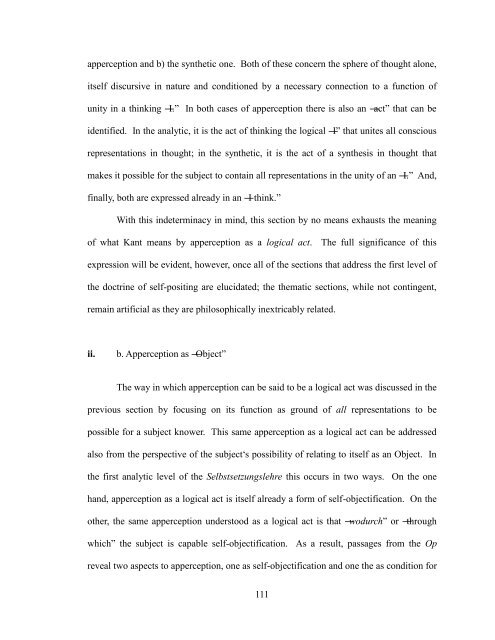The Doctrine of Self-positing and Receptivity in Kant's Late ...
The Doctrine of Self-positing and Receptivity in Kant's Late ...
The Doctrine of Self-positing and Receptivity in Kant's Late ...
Create successful ePaper yourself
Turn your PDF publications into a flip-book with our unique Google optimized e-Paper software.
apperception <strong>and</strong> b) the synthetic one. Both <strong>of</strong> these concern the sphere <strong>of</strong> thought alone,<br />
itself discursive <strong>in</strong> nature <strong>and</strong> conditioned by a necessary connection to a function <strong>of</strong><br />
unity <strong>in</strong> a th<strong>in</strong>k<strong>in</strong>g ―I.‖ In both cases <strong>of</strong> apperception there is also an ―act‖ that can be<br />
identified. In the analytic, it is the act <strong>of</strong> th<strong>in</strong>k<strong>in</strong>g the logical ―I‖ that unites all conscious<br />
representations <strong>in</strong> thought; <strong>in</strong> the synthetic, it is the act <strong>of</strong> a synthesis <strong>in</strong> thought that<br />
makes it possible for the subject to conta<strong>in</strong> all representations <strong>in</strong> the unity <strong>of</strong> an ―I.‖ And,<br />
f<strong>in</strong>ally, both are expressed already <strong>in</strong> an ―I th<strong>in</strong>k.‖<br />
With this <strong>in</strong>determ<strong>in</strong>acy <strong>in</strong> m<strong>in</strong>d, this section by no means exhausts the mean<strong>in</strong>g<br />
<strong>of</strong> what Kant means by apperception as a logical act. <strong>The</strong> full significance <strong>of</strong> this<br />
expression will be evident, however, once all <strong>of</strong> the sections that address the first level <strong>of</strong><br />
the doctr<strong>in</strong>e <strong>of</strong> self-<strong>posit<strong>in</strong>g</strong> are elucidated; the thematic sections, while not cont<strong>in</strong>gent,<br />
rema<strong>in</strong> artificial as they are philosophically <strong>in</strong>extricably related.<br />
ii. b. Apperception as ―Object‖<br />
<strong>The</strong> way <strong>in</strong> which apperception can be said to be a logical act was discussed <strong>in</strong> the<br />
previous section by focus<strong>in</strong>g on its function as ground <strong>of</strong> all representations to be<br />
possible for a subject knower. This same apperception as a logical act can be addressed<br />
also from the perspective <strong>of</strong> the subject‘s possibility <strong>of</strong> relat<strong>in</strong>g to itself as an Object. In<br />
the first analytic level <strong>of</strong> the Selbstsetzungslehre this occurs <strong>in</strong> two ways. On the one<br />
h<strong>and</strong>, apperception as a logical act is itself already a form <strong>of</strong> self-objectification. On the<br />
other, the same apperception understood as a logical act is that ―wodurch‖ or ―through<br />
which‖ the subject is capable self-objectification. As a result, passages from the Op<br />
reveal two aspects to apperception, one as self-objectification <strong>and</strong> one the as condition for<br />
111


